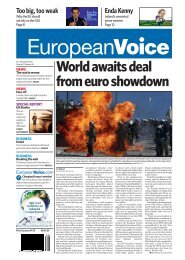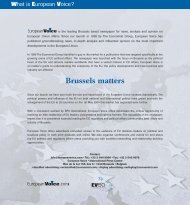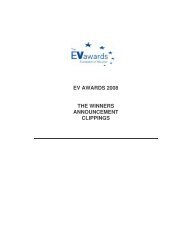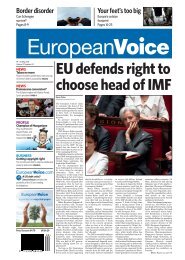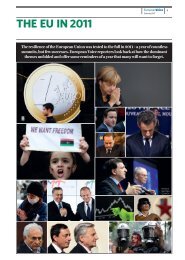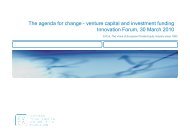special report - European Voice
special report - European Voice
special report - European Voice
You also want an ePaper? Increase the reach of your titles
YUMPU automatically turns print PDFs into web optimized ePapers that Google loves.
CAREERS<br />
30 May 2013<br />
21<br />
JOBS Commission<br />
EU ADVICE<br />
certified<br />
www.eipa.eu<br />
More info: e.haenen@eipa.eu<br />
Training and Certification Course<br />
Data Protection Compliance<br />
Maastricht (NL), 24-28 June 2013<br />
Gain an insider’s working<br />
knowledge of data protection<br />
JOHAN DACKNER Senior nuclear safeguards inspector in the <strong>European</strong> Commission’s energy<br />
directorate-general.<br />
Fusion of skills and energy<br />
Being a nuclear safeguards inspector is a huge responsibility,<br />
Johan Dackner tells Ian Mundell<br />
The first complete course for data protection officers and other data protection<br />
professionals. In collaboration with the network of DPOs of the EU institutions,<br />
agencies and bodies and with the support of the <strong>European</strong> Data Protection<br />
Supervisor.<br />
Learn now about the latest developments and challenges<br />
from leading experts!<br />
MOVERS & SHAKERS<br />
There are not many jobs<br />
in the <strong>European</strong> Commission<br />
that give you<br />
the right to a <strong>special</strong> kind of<br />
passport. “We all carry an inspector’s<br />
card,” says Johan<br />
Dackner, producing a set of<br />
documents bound between<br />
sturdy green covers. “That<br />
authorises me to access any<br />
nuclear installation holding<br />
fissile material.”<br />
Dackner is a senior nuclear<br />
safeguards inspector in<br />
the Commission’s energy directorate-general<br />
in Luxembourg.<br />
He and his colleagues<br />
make sure that all the <strong>European</strong><br />
Union’s civil fissile material<br />
– material such as uranium,<br />
plutonium and<br />
thorium, which is capable of<br />
sustaining a nuclear reaction<br />
– is in the right place, is used<br />
for its intended purpose and<br />
does not go missing. “In<br />
some respects you could<br />
liken us to accountants, but<br />
we don’t count money, we<br />
count uranium and plutonium<br />
atoms,” says Dackner.<br />
Ensuring that nuclear installations<br />
are operated safely<br />
and securely is usually a<br />
matter for national authorities,<br />
but the Euratom treaty<br />
gives the Commission responsibility<br />
for verifying that<br />
nuclear proliferation is not<br />
taking place from civil<br />
sources. As a result, all civil<br />
fissile material must be declared<br />
to the Commission.<br />
Some material is used in<br />
nuclear power plants or research<br />
facilities, some is undergoing<br />
reprocessing or<br />
stored as waste. The nuclear<br />
safeguards directorate<br />
checks that these declarations<br />
are complete and consistent<br />
on paper. Then it<br />
sends out inspectors to<br />
check the reality.<br />
Most inspectors have a<br />
background in physics or engineering,<br />
to which the<br />
Commission adds around a<br />
year of training. Dackner<br />
studied nuclear engineering<br />
in Sweden, going on to work<br />
at a nuclear fuel fabrication<br />
plant and then in a reactor<br />
training centre. The idea of<br />
becoming a safeguards inspector<br />
only came to him<br />
when he saw the job advertised.<br />
“There are 160 of us, so<br />
it’s a very small cadre of people<br />
doing this in the <strong>European</strong><br />
Union,” he says. “So<br />
was I expecting that? No,<br />
not at all. But I do find it<br />
challenging and interesting.”<br />
Physical inspection<br />
Each inspection involves<br />
verifying that the objects listed<br />
are physically there, accurately<br />
labelled and consist of<br />
the material described. Inspecting<br />
a nuclear reactor<br />
might take one person one<br />
day, while a reprocessing<br />
plant might involve a team<br />
working for up to a week. “If<br />
it’s a fuel assembly, I can very<br />
easily see that it is a fuel assembly,”<br />
Dackner explains.<br />
“But if it is a spent fuel assembly<br />
that has come out of<br />
the reactor, it will be highly<br />
õ The <strong>European</strong> Commission has appointed Kurt Vandenberghe, a Belgian national, as director for<br />
environment in its research department. Vandenberghe is currently the head of the private office of<br />
Janez Potočnik, the <strong>European</strong> commissioner for environment, and was previously deputy head of the<br />
private office when Potočnik was commissioner for science and research. Previously, Vandenberghe<br />
served in the private office of Philippe Busquin, <strong>European</strong> commissioner for research, in 1999-2004.<br />
He joined the Commission in 1996. He replaces Andrea Tilche, acting director, on 1 July.<br />
õ Maria Cristina Russo of Italy has been appointed director for international co-operation in the<br />
<strong>European</strong> Commission’s department for research and innovation. She is currently head of unit for<br />
financial services and redress in the Commission’s department for health and consumer affairs. Russo,<br />
who joined the Commission in 1992, also served in the secretariat-general and – like Vandenberghe –<br />
as a member of Busquin’s private office in the Prodi administration. She replaces Laurent Bochereau,<br />
acting director, on 1 July.<br />
õ Hanna Pennock, a Dutch national, has been appointed acting director-general of the International<br />
Council of Museums (ICOM), an organisation serving museum professionals. She replaces Julien<br />
Anfruns after his return to France’s culture ministry. Pennock is scheduled to serve until the end of the<br />
year.<br />
õ François de Bie of the Netherlands has been elected chairman of <strong>European</strong> Bioplastics, an<br />
association of firms producing or working with bio-based or bio-degradable plastics.<br />
õ Send details of Movers & Shakers to info@europeanvoice.com<br />
radioactive and stored about<br />
nine metres underwater in a<br />
spent fuel pond. For that, I<br />
will need a device that allows<br />
me to say that it still is<br />
uranium as opposed to anything<br />
else.”<br />
Little personal risk is involved,<br />
yet it is not a job to be<br />
taken lightly. “A lot of responsibility<br />
is placed on you<br />
as an individual,” Dackner<br />
says. “When on-site you have<br />
to think on your feet, you will<br />
be faced with a certain number<br />
of decisions and a certain<br />
amount of assertiveness<br />
might be required.”<br />
That is part of the job’s attraction,<br />
along with the variety<br />
of installations he has<br />
visited over 15 years as an inspector.<br />
“I’ve seen a width of<br />
the nuclear power industry<br />
that I would not have seen if<br />
I’d been working as an engineer<br />
<strong>special</strong>ising in one particular<br />
aspect.”<br />
Yet most of the time this<br />
search for something out of<br />
place leads nowhere. “Nuclear<br />
operators in Europe<br />
perform very well,” Dackner<br />
says. “We haven’t had any<br />
cases of diversion of nuclear<br />
material. What we sometimes<br />
find is that human error<br />
will come in. Someone<br />
will have written down the<br />
wrong thing in an accountancy<br />
line, and that’s what<br />
the verifications are there<br />
for.”<br />
Ian Mundell is a freelance<br />
journalist based in Brussels.<br />
T<br />
For advertising in print and on our<br />
online career platform contact:<br />
Sue Hedges at susanhedges@economist.com<br />
or +44 20 8859 1249<br />
www.europeanvoice.com/vacancies<br />
IN THE MONEY A raft of legislation on financial services<br />
POWER OF A UNION The EU’s plans for a banking union<br />
Birthday celebrations<br />
for Europe’s<br />
Don’t miss out<br />
single market<br />
cannot hide some<br />
persistent and<br />
deep flaws, writes<br />
Ian Wishart<br />
on EV Special Reports.<br />
Subscribe today.<br />
There is no shortage of conflicting<br />
views on the single<br />
market. Some people regard<br />
it as the greatest achievement<br />
of the <strong>European</strong><br />
Union. Others doubt that it<br />
exists. Some credit it with<br />
doing more to bring its peoples<br />
together than any other<br />
development in post-war<br />
history. Others maintain<br />
13 that it is a painful and alltoo-clear<br />
illustration of the<br />
25 October 2012<br />
EU’s inability to join up fragmented<br />
markets and establish<br />
the most basic of common<br />
standards. There will<br />
be plenty who approach next<br />
month’s ‘20th anniversary’<br />
celebrations with some<br />
weariness.<br />
The celebrations are as<br />
much to do with wanting to<br />
inject the single market with<br />
LOSING THE WILL However political priorities change, global warming 15 remains a threat<br />
fresh impetus as marking 15 a<br />
13 September 2012<br />
11 October true 2012 starting-point. The<br />
DISCUSSIONS IN DOHA Will countries show their commitment to the climate-change roadmap?<br />
20th anniversary is an approximation<br />
to what was, step too far for many <strong>European</strong>s, was a bruising experience for t<br />
YOU WIN SOME... Trade unionists demonstrate in 2006 agains<br />
EMISSIONS TRADING The flagging price of carbon and bad press for the ETS<br />
back in 1992, a deadline. France and the Netherlands. REUTERS<br />
BEING PREPARED Why adapting to climate change is as important as mitigation<br />
The single <strong>European</strong> act actually<br />
took effect in 1987. It<br />
SPECIAL REPORT<br />
Twenty ye<br />
GREEN MONEY Tying funding to environmental issues could solve budget stalemate<br />
was inspired by the <strong>report</strong><br />
drawn up in 1985 by the<br />
then <strong>European</strong> commissioner<br />
for the internal market<br />
EU Studies<br />
Arthur Cockfield. That <strong>report</strong><br />
set out 297 measures<br />
15<br />
GEM OF AN IDEA OPAL looks at how national parliaments engage in EU politics<br />
that were needed to complete<br />
the single market by out, broken up and nation-<br />
More subtly, the spectre of<br />
4 October 2012<br />
EIB INSTITUTE Applied economics and reaching out to university networks<br />
the end of 1992. From 1986 alised. They have withdrawn an EU of variable speeds is<br />
GENDER AND THE EU Is enough attention paid to gender issues in EU policies?<br />
to 1992 the EU adopted from cross-border lending to up and running and threatening<br />
the uniformity of a<br />
nearly 280 pieces of legislation<br />
aimed at breaking down markets. The idea of a uni-<br />
single market. The rancour<br />
retrench on their domestic<br />
SPECIAL REPORT<br />
the barriers between member<br />
states. What the 20th talked about longer even 8-9 December, when David<br />
tary patent, which has been of the <strong>European</strong> Council of<br />
anniversary celebrations are than the single market itself, Cameron, the British prime<br />
The future of food<br />
trying to re-create is the atmosphere<br />
of those formative drawing board (see page 16). change after failing to win<br />
lingers frustratingly on the minister, blocked treaty<br />
years during the <strong>European</strong> The <strong>European</strong> single currency,<br />
which was meant to service regulation, brought<br />
exemptions from financial<br />
EXPENSIVE TASTES The rising cost of food<br />
17<br />
Commission of Jacques Delors,<br />
and the widespread realise the single market’s home the extent to which<br />
27 September 2012<br />
WHAT A WASTE From field to plate to dustbin<br />
awareness of “1992”, which potential, instead threatens the member states fall short<br />
GROWING CONTROVERSY The battle over GM rages on<br />
in the business world took to undermine it. The wave of of a common vision of the<br />
on an almost millenarian austerity that has swept single market. Proposals for<br />
DESIGNER LABELS What<br />
SPECIAL<br />
information should be on our food?<br />
REPORT image.<br />
across the continent tempts a banking union that the<br />
member-state governments Commission published yesterday<br />
(12 September) (see<br />
Changing times<br />
TORTILLA into protectionism, TROUBLE state aid,<br />
But how to achieve fresh impetus?<br />
Much of the early in-<br />
against thetical increases to a single the market. ble challenge: How can a<br />
A and protest other in Mexico behaviour City anti-<br />
page 20) will be a formida-<br />
Renewable energy<br />
nocence about the single price Anti-EU of corn. parties REUTERShave capitalised<br />
on the eurozone’s difpervisor<br />
be made compati-<br />
single eurozone banking su-<br />
market’s potential has faded.<br />
LEGISLATION Is the economic crisis dethroning the 2020 targets? Some of its ideals are in tatters.<br />
The dream of crossstream<br />
parties are ket? The UK suggests that 13<br />
ficulties – and even mainble<br />
with the EU’s single mar-<br />
SOLAR SUBSIDIES Sudden changes are discouraging potential investors border consolidation between<br />
large banks to provide doms of the Schengen area tion conflicts with the free-<br />
tampering with the free-<br />
tighter <strong>European</strong> integra-<br />
FORWARD PLANNING The <strong>European</strong> grid needs adapting to accommodate deeper and more new energy liquid capital<br />
markets is tarnished. epitomised the achieve-<br />
Much of the rest of the EU<br />
sources of borderless travel that once doms of the single market.<br />
FRIEND OR FOE? Changing<br />
SPECIAL<br />
attitudes towards biofuel<br />
REPORT<br />
Banks have had to be bailed ments of the single market. argues the opposite.<br />
REUTERS<br />
SPECIAL REPORT<br />
Climate change<br />
The single market<br />
ON AND ON AND ON The struggle for a Europe-wide patent<br />
BOARD GAMES A blueprint for companies’ senior executives<br />
HIT THE SWITCH Liberalising Europe’s energy markets<br />
IN THE MONEY A raft of legislation on financial services<br />
POWER OF A UNION The EU’s plans for a banking union<br />
Throughout the year, <strong>European</strong> <strong>Voice</strong> takes an in-depth look at some<br />
of the main issues affecting Europe. For news, features and the facts<br />
on the subjects affecting the headlines, <strong>European</strong> <strong>Voice</strong>’s Special<br />
Birthday celebrations<br />
for Europe’s<br />
e proposed services directive. The proposal, which aimed to deepen the single market, proved a<br />
<strong>European</strong> Commission and was blamed for the ‘No’ votes on the EU constitutional treaty single market<br />
cannot hide some<br />
Reports are your most reliable source.<br />
persistent and<br />
deep flaws, writes<br />
Ian Wishart<br />
ars On of ever-thinner progress? Food forice<br />
thought<br />
There is no shortage of conflicting<br />
views on the single<br />
market. Some people regard<br />
But with pressure come mittee on internal market for ensuring that it is applied<br />
it as the greatest achievement<br />
of the <strong>European</strong><br />
opportunities. Michel and consumer protection. “It and promoted in member<br />
Union. Others doubt that it<br />
Barnier, the <strong>European</strong> commissioner<br />
for the internal where we have problems. politicians and officials<br />
doing more to bring its peo-<br />
also brings into sharp focus states. He and other EU<br />
Visit www.europeanvoice.com/tryEV<br />
New worlds of<br />
exists. Some credit<br />
study<br />
it with<br />
market, has set in motion an On things like copyright and know that proposals to overhaul<br />
Europe’s copyright<br />
development in post-war<br />
ples together than any other<br />
unprecedented conveyor [orphan] works and the<br />
belt of financial-service legislation<br />
that would scarcely ucts across borders.” tive Demographic dispute resolution challenges laws, demand new <strong>European</strong> that it is patterns a painful and ditional all-<br />
food is strongly tive of increasing agricultur-<br />
ability to source digital prod-<br />
regime, to establish alterna-<br />
history. Others maintain<br />
have been thinkable five He says that technology to enable the mutual recognition<br />
in growing, of professional distributing quali-<br />
and consuming food, EU’s writes inability Dave to join up fragture,<br />
which perhaps explains In some ways the policies<br />
too-clear illustration of identified the with regional culal<br />
output and fishing yield.<br />
years ago (see pages 18-19). has altered people’s perception<br />
of how the single marfications,<br />
and to carry out a<br />
mented markets and estab-<br />
why <strong>European</strong>s have been so have been victims of their<br />
Using the crisis to justify the<br />
Keating<br />
lish the most basic of common<br />
standards. There nology will like genetically mod-<br />
Europe’s fish stocks are over-<br />
suspicious of new food tech-<br />
own success. Today, 75% of<br />
introduction of tighter, more ket can benefit them. “People<br />
are doing more remote ment Last rules year, humanity are of pressing reached global conundrum beset by curity is be about plenty human who approach secuified<br />
nextcrops (see pages 18-19). fished, according to the Eu-<br />
revision of public procure-<br />
uniform regulation across<br />
the EU, the results might yet transactions and they want importance: a rather unsettling without milestone.<br />
growth The earth’s there popula-<br />
will be mental concerns.<br />
But celebrations while the number with of some world worries about food tensive agricultural practices<br />
economic<br />
looming health and environrity.”<br />
month’s ‘20th anniversary’ But while the rest of the ropean Commission, and in-<br />
create a real and credible to be able to pay and to have<br />
single market in financial their data secure – and data no solution reached to seven the eurozone billion, Recent increases in food people weariness. is growing, the shortages, Europe is dealing pose dangers to biodiversity<br />
services.<br />
protection which would crisis. up from three billion just five prices, which have already amount The of land celebrations earth is are with as the opposite problem. and water supply. Reforms<br />
have been seen as a civil liberties<br />
issue is now a crucial ebrations, the population the to reach <strong>European</strong> nine hunger, are already re-<br />
farming inject must the be single used market to in with Europe over the past half ing debated by MEPs and<br />
decades As well ago. as leading Experts the expect cel-<br />
led to food riots and mass not. This much means to do new with ways wanting of The toabundant supply of food of both policies currently be-<br />
Digital economy<br />
billion by 2050. That means minders of the dangers increase yield (see page century has led to overconsumption<br />
and, in turn, rising ing to balance this out, re-<br />
member states are attempt-<br />
Progress in other areas is no single market issue as well,” Commission will set out a<br />
fresh impetus as marking a<br />
nine billion mouths to feed. posed by an inability to feed 18). More controversially,<br />
l i l “Th h<br />
f h li fi d i<br />
true starting point The<br />
Subscribe today and you’ll never miss out on our unique coverage.<br />
ments such as the drought in<br />
the United States this summer.<br />
Spiking commodity<br />
prices are already having an<br />
effect on grocery stores<br />
across Europe.<br />
The growing middle class<br />
in India and China will also<br />
alter the picture. As those<br />
populations earn more, they<br />
choose to eat more meat and<br />
fish. This will drive up prices<br />
in Europe, and could oblige<br />
<strong>European</strong>s to switch to kinds<br />
of meat and fish not tradition-



